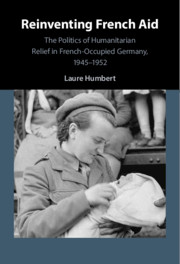Book contents
- Reinventing French Aid
- Reinventing French Aid
- Copyright page
- Dedication
- Contents
- Figures
- Acknowledgements
- Note on the Text
- Abbreviations
- Introduction
- Part I The Politics of Relief
- Part II Reconstructing the Body, Rehabilitating the Mind?
- 4 The ‘Broken’ DP
- 5 ‘Rehabilitation’ through Work?
- 6 Transforming DPs into French Citizens?
- Conclusion
- Select Bibliography
- Index
6 - Transforming DPs into French Citizens?
The Resettlement of DPs in France
from Part II - Reconstructing the Body, Rehabilitating the Mind?
Published online by Cambridge University Press: 20 May 2021
- Reinventing French Aid
- Reinventing French Aid
- Copyright page
- Dedication
- Contents
- Figures
- Acknowledgements
- Note on the Text
- Abbreviations
- Introduction
- Part I The Politics of Relief
- Part II Reconstructing the Body, Rehabilitating the Mind?
- 4 The ‘Broken’ DP
- 5 ‘Rehabilitation’ through Work?
- 6 Transforming DPs into French Citizens?
- Conclusion
- Select Bibliography
- Index
Summary
The period from the spring of 1947 to the end of 1951 witnessed the development of several schemes for the recruitment of the ‘worthiest’ DPs in France. The selection of DPs was influenced both by the domestic dynamics of French politics of national recovery and the external agendas of the IRO, which provided funding and shaped the ways the recruitment took place in the field. Originally, conceived as a plan to attract single workers, the scope of the French recruitment scheme was enlarged in 1948 to encompass DP families. The ideal DP family remained, however, healthy, patriarchal and nuclear. Recruiters and medical doctors drew heavily on assumed norms of patriarchal breadwinner and obligation. They wanted to avoid the recruitment of those who could be considered as a ‘burden’ for France. In categorising able and less abled bodies, they often implicitly resorted to moralist, eugenicist and hygienist considerations. In recruiting DP workers and families, French recruiters were not solely interested in attracting productive DP and assimilable migrants. Rather, French occupation officials were also concerned about the image of France abroad. The issue of France’s unpopularity was particularly salient, in a context when French officials strove to restore France’s prestige.
- Type
- Chapter
- Information
- Reinventing French AidThe Politics of Humanitarian Relief in French-Occupied Germany, 1945–1952, pp. 293 - 324Publisher: Cambridge University PressPrint publication year: 2021

